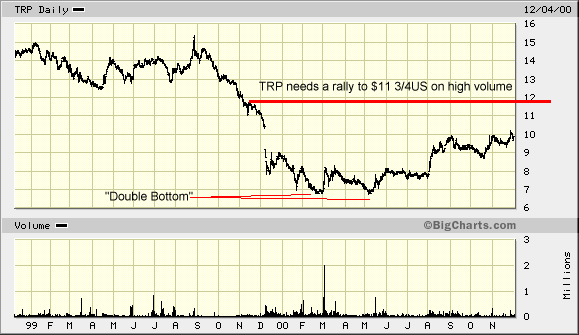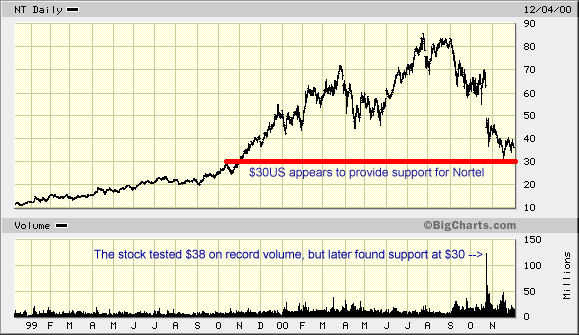December
2000 Newsletter
Has
The Tide Turned Against the Bull Market?
By
Chris Lau
Written on December 5th 2000
|
Review
of October Stock Picks
|
|
Company
|
Oct
10/00 Price
|
Dec
7/00 Price |
Return |
|
Nokia
|
|
$51.68
|
47.7%
|
|
Texas
Instrument
|
|
$45.69
|
1.01%
|
|
Motorola
|
|
$19.00
|
-26.7%
|
|
Intel
|
|
$36
|
-4.15%
|
|
|
As if October
was not bad enough, November was worse for the markets!
If history was any indication, the US presidential election
was supposed to be the year that stocks did well. What were
the ODDS of a near-tie?! The market was not expecting the
potential lawsuits building from both parties. In Wall Street
lingo, the market was not expecting to face uncertainty.
The market HATES uncertainty! That is one of the major factors
pulling the markets down. Compounding the problem is a fear
that overall economic growth is slowing.
Question: what
the key driver of the bull market was over the last ten
years? Answer: consumer demand. So far, consumer demand
appears strong. What looms are the effects of a tightening
monetary policy (i.e. raising interest rates), which usually
takes time to make its way in the economy.
Back to 1998?
In late 1998,
the stock market was stumbling because of concerns in the
debt market in Russia and Asia. Banks were "tight" with
lending money, as they often ended up "burned" from bad
bonds that would never be paid back. Consequently, some
major banks had to make major write-offs. 2 years later,
it is becoming more apparent that we are in a similar situation.
The only difference is that the bad debt is coming from
telecommunication start-ups and other telecom-related companies.
That is why bank stocks are falling from the sky.
As of November
22nd, Citicorp
was $47 1/6US down from a high of $59 1/8 (all figures in
US dollars), Bank
of America was $38 9/16 (its p/e is 8!), and Morgan
Stanley Dean Witter was $64 3/8 (falling from a recent
high of 110!). Interestingly enough, some compelling value
is being created in the financial markets. In the dotcom-like
brokerage side, E*Trade
is a paltry $10 1/8! At current prices, one should wonder
if the company will soon become subject of a takeover later
on down the road.
Pure Madness?
The mood is far too pessimistic, and I do not think the
market is on a continued downtrend. What I think could happen
is that the markets will remain at oversold levels, and
value investors will start to come in and buy great stocks
at good prices. Stocks such as Macromedia Inc., Rational
Software, Open Text, Intel, Avaya Inc., C-Mac Industries,
and Celestica are great companies with pretty good
prices (considering their growth rates and leadership positions
in the market). I don't think the market is entirely "cleansed".
Starbucks and
Krispy Kreme Donuts are stocks that are VERY expensive relative
to their realistic growth rates. While they are well run
companies, the stock is priced to perfection, leaving little
room for management to err on executing its growth strategy.
It is ironic that the market cleaned out solid dotcom plays
like Yahoo Inc, and AOL, but kept the premiums on companies
that are vulnerable to changes in consumer taste, as well
as competition.
|
Instructions:
To Read My www.iExchange.com
Reports:1. Click on 
2.
Type "Market Analysis Founder" in Name Search
3.
Read my stock pick reports (Free!)!
|
What does
one buy now?
Simple
answer: TransCanada pipelines. The Market Analysis site
traditionally focused on technology stocks, not slow moving,
"boring" stocks like TransCanada. In times like these, especially
over the next 6 - 18 months, it is going to be very rough
on Wall Street. It is a good idea to have some defensive
stocks like TransCanada Pipelines, a company that is a story
in itself.
Why TransCanada?!
The
pipeline stock sports a 5.4% dividend but more importantly,
I believe it is a turnaround story. About 2 years ago, the
company merged with Nova Corp. to form an ultra-fat
pipeline company. It was realizing huge competition, huge
costs in servicing debt, and the "synergies" of the two
companies was not as great as the market expected. Since
then, a new management and more importantly, a new CEO sold
off the non-core assets. The company is thinner, and in
the past two quarters, showed impressive earnings growth.
As a near "rule of thumb," the success of a company turning
itself around is indicated by at least two consecutive quarters
of improving earnings. That is the case with TransCanada
Pipelines. Keep an eye on the company as it continues to
show fundamental improvements. (Click
here to read my TRP Report!)

What about
Nortel?
Given market conditions, it is always a good idea to look
beyond the Nasdaq markets and to wait for economic data
to come in. It is crucial that we get evidence that the
economy isn't stalling significantly, and that a tight debt
market isn't justified. In the mean time, take small steps.
Getting into Nortel a bit at a time might not be a bad idea,
but that comes with a word of advice: large telecom companies
were inclined to scale back spending in the last quarter.
The telecom companies are under pressure with their own
investors to show some return on investments. Therefore,
current and potential investors in Nortel need evidence
that such reduced spending will not carry in 2001 and beyond.
From a technical charting analysis Nortel may have trouble
breaking past $60 Cdn. If it can trade beyond that level
on high volume, the stock makes a good short-term profit
candidate. But watch out if the stock fails (on several
occasions) to rally past $60. From a "fair valuation" perspective
(comparing P/E to the expected growth rate), Nortel could
fall to $49 Cdn.

Your point
being…
360 networks looks like it is starting to have good
value. Although the company warned revenue would not be
as high as anticipated, it is moving into the higher margin
business of carrying the fibres for data networking. And
JDS Uniphase? It is the same story as Nortel. An
expensive stock, but if growth rates can be confirmed for
the next year and beyond, JDS would prove to be a good long-term
holding.
What about
"traditional" bricks n' mortar?
Allocation and diversification will always be the key to
successful investing. It doesn't matter if you scored big
on one big tech stock, it DOES matter if you put much of
your assets in the best performing sectors. If the negative
sentiment for technology stocks continues, it might be a
good idea to invest in retail stocks. You are correct to
assume that a slowing economy means bad news for retail,
but remember - the market is filled with fear. It is assuming
that the economy is slowing down. From the Canadian side,
I like Hudson's Bay (because of all the "back-end"
efficiencies the company is implementing). I like Wal-Mart
on the U.S. side. Both companies are solid, with Hudson's
Bay a better value play than the well-run (and therefore
more expensive) Wal-Mart. By January the market should have
some economic figures confirming or negating a deteriorating
economy. It should prove to make or break portfolio, at
least in the short-term.
(c) 2000 Market Analysis
Canada
Simplified Disclaimer:
The information contained herein is for your exclusive,
personal use only. The report herein is not to be reproduced
for distribution without the expressed written consent of
Market Analysis. Stock investing entails risk, so use information
contained herein at your own risk.
|

